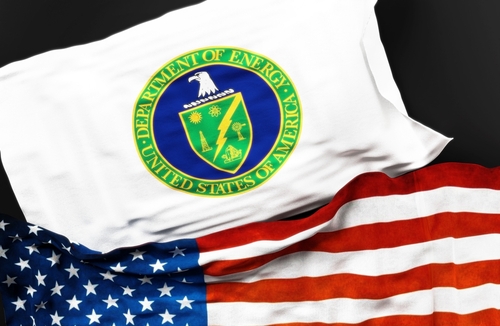US Department of Energy awards $108m to 13 SAF projects

The US Department of Energy (DOE) has awarded $108m million in funding to 13 Sustainable Aviation Fuel (SAF) projects. They are a mixture of pre-pilot, pilot, and demonstration projects by both private companies and universities.
The money was awarded to a mixture of pre-pilot, pilot, and demonstration projects. At AVAPCO received $80m – more than half the total – with MicroBio Engineering getting $600,000.
“Biofuels are a versatile tool because they have the immediate potential to power our ships, trains, airlines and heavy-duty vehicles—a huge contributor to total carbon emissions—with a significantly reduced carbon footprint,” said Jennifer Granholm, US Secretary of Energy. “DOE investments are helping to build out a domestic bioenergy supply chain that increases America’s energy independence, creates jobs, and accelerates the adoption of cleaner fuels for our transportation needs.”
Nine of the grants were for pre-pilot scale-up; two for pilot-scale up; two for demonstration scale-up; and four for Gen-1 corn ethanol emission reduction.
The DOE says that all the projects support the US Sustainable Aviation Fuel Grand Challenge.Four Gen-1 Corn Ethanol Emission Reduction projects were also awarded $10m by the DOE.
In December 2022, the UK Advanced Fuels Fund agreed $99m in grants for five UK SAF projects.
Demonstration Scale-up
Alder Fuels -$2m
Washington DC
Decarbonizing the Skies – Sustainable Aviation Fuel from Alder Biocrude Oil
Funds to complete the engineering design work to establish the Alder Fuel’s demonstration facility – set to process 120 dry metric tonnes per day of forest wastes and produce 3 million gallons per year of liquid hydrocarbon biofuel.
Partners: Honeywell UOP, Enviva, BTG Bioliquids, Technip Energies, Audubon Engineering, Green Star BCS, RPD Technologies, NREL, INL, ANL, ORNL, Washington State University
AVAPCO – $80m
Thomaston, Georgia
AVAP Biorefinery: Enabling Net Zero™
AVAPCO will use the funds to build a 1.2 million gallon per year refinery using wood chips. It will also produce SAF aromatics for testing and certification allowing it to be used unblended. Aiming for a SAF minimum sales price equivalent to conventional jet fuel.
Pilot projects
Lanza Tech – $1.64m
Skokie, Illinois
RESTORE: Replenishing EcoSystems by Transforming Residues to Energy
Piloting an field-deployable, zero-discharge, biorefinery concept to producer ethanol feedstock for larger LanzaJet alcohol-to-jet SAF facilities – and biochar for soil amendment. Looking at using small-bore trees removed by the US Forest Service (USFS) to reduce wildfire risk.
Partners: Pacific Northwest National Laboratory, USDA ARS, RSB
MicroBio Engineering – $579,673
San Luis Obispo, CA
Scale-up of Hydrothermal Liquefaction with Supercritical Water Oxidation in an Integrated Biorefinery
Converting waste-water sludge into SAF. The supercritical water oxidation process requires no catalysts and generates heat that can be recovered for use in the hydrothermal liquefaction process.
Partners: Great Lakes Water Authority, General Atomics, Leidos, Pacific Northwest National Laboratory, Kilgore
Pre-Pilot
Algenesis – $5m
Cardiff, CA,
Pre-Pilot Scale Production of Algae-based Jet Fuel and Polyurethane Monomers
Algenesis says that to be competitive with fossil fuels, SAF producers need to produce other products like sustainable and biodegradable algae-based polyurethanes.
Captis Aire – $2m
East Point, Georgia
Renewable Blending Components to Enable 100% Sustainable Aviation Fuel (SAF)
Captis plans to capture gases from wood waste burning (terpenes) and blend these with SAF allowing it to be used at 100%. It will also capture green house gases that are created when waste wood is burnt.
Project team: Boeing, Oak Ridge National Lab, Washington State University
Comstock – $2m
Virginia City, Nevada
Production of Renewable Diesel, Sustainable Aviation Fuel, Gasoline, and Marine Fuel from Lignocellulosic Biomass at Dramatically Improved Yield, Efficiency, and Cost.
Funding for a pre-pilot scale system to to convert forestry residues into renewable diesel, SAF, gasoline, and marine fuel. It is aiming for a minimum fuel selling price of less than $2.65.
Partners: Haldor Topsoe (catalysts), Marathon Petroleum (refining), Novozymes, Xylome Corporation (bioconversion), RenFuel K2B (catalysis), Emerging Fuels Technology (hydrotreating), University of Nevada Reno (operations), University of Minnesota Duluth, Natural Resources Research Institute (feedstock), and State University of New York College, Environmental Science and Forestry (feedstock).
Global Algae Innovations – $3.6m
San Diego, California
Algae Direct Air Capture Scale-up to Multi-Acre Raceways
Direct carbon dioxide capture from algae. Because Global Algae Innovations use raceways they do not need a carbon dioxide distribution system. Funding will be used to create a 12-acre raceway producing 50,000 gallons per year. They are targeting $2.50/gallon of gasoline equivalent (GGE).
MicroBio Engineering – $3.978m
San Luis Obispo, California
Attached Algae Flow Ways for Biofuels Production Utilizing Air-CO2
Using algae to create SAF by capturing carbon dioxide from the air and clean contaminated water.
Partners: Sandia National Laboratory, Cal Poly State University, Pacific Northwest National Laboratory, HydroMentia Technologies, Heliae Development, AECOM,
Research Triangle Institute – $2m
Research Triangle Park, North Carolina
A Corn Stover Pyrolysis Pathway for Sustainable Aviation Fuel
Project converting pre-processed corn stover into SAF using a catalytic fast pyrolysis (CFP), pathway. Pre-processing will remove alkali and alkaline earth metals, corn stover CFP.
Partners: POET Research, National High Magnetic Field Laboratory – Florida State University
University of California – $2m
Riverside, California
Scale-up Demonstration of Hybrid Catalytic Biorefining of Biomass to Sustainable Aviation and Marine Fuels
Funding will be used to build pre-treatment and lignin fractionation operation cable of processing 0.5 tons of hardwood each day.
Partners: Suncor Energy, MG Fuels
University of Utah – $2m
Salt Lake City, Utah
Entrained-Flow Biomass Gasification with Syngas Fermentation for Production of Sustainable Aviation Fuels
Demonstrating that municipal solid waste can be efficiently processed in a pressurized entrained-flow gasifier to produce syngas suitable for SAF.
Partners: Ensyn Corporation, LanzaTech, Linde, Pacific Northwest National Laboratory
Viridos – $2m
La Jolla, CA
Pre-Pilot Scale Production of Algae-based Jet Fuel and Polyurethane Monomers
Viridos (formerly Synthetic Genomics) wants to demonstrate large scale oil extraction of algal biomass and upgrading of algal oils.
